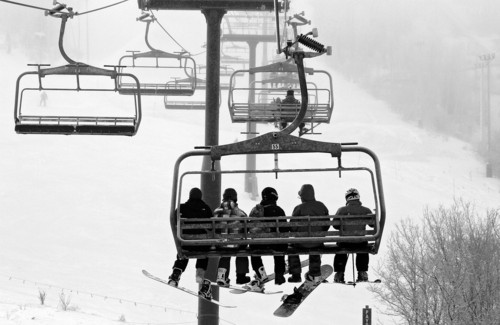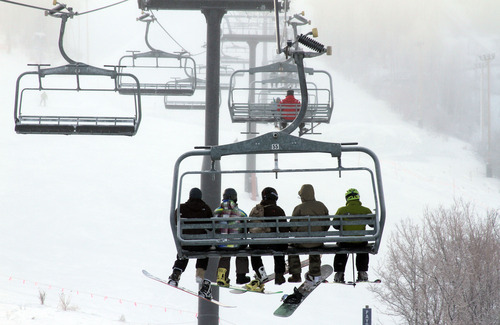This is an archived article that was published on sltrib.com in 2014, and information in the article may be outdated. It is provided only for personal research purposes and may not be reprinted.
The CEOs of Park City Mountain Resort and Vail Resorts are engaging in a public war of words that parallels the high-profile lawsuit between the Park City-area ski giants.
John Cumming from Powdr Corp., PCMR's parent company, fired the latest shot Friday in response to two letters sent in the past three weeks by Vail Chief Executive Rob Katz. Like Katz's letters, Cumming's answer was shared with the news media.
"Your letters," Cumming wrote Katz, "are part of a transparent plan to pressure me and my company into agreeing to a Vail takeover" of PCMR. It will never happen, he added. "We won't cave in, and we won't agree to a Vail takeover that would deprive our guests and our community of all the benefits offered by three resorts that compete with each other."
Cumming was referring to Park City's three ski areas: Deer Valley Resort, along with PCMR and Canyons Resort, which Vail operates on a long-term contract for Talisker Corp.
The lawsuit revolves around whether PCMR failed to renew its lease for most of its mountain from Talisker, or if Talisker improperly rejected PCMR's offers to buy that land or to pay fair-market value or more to rent it.
Katz maintained in his April 15 letter to Cumming that PCMR was "causing unnecessary alarm in the community" with its portrayal of the situation as big, bad Vail trying to take over little independent PCMR — and contending that one resort shouldn't operate two resorts in the same community.
"Your own company operates both Killington and Pico, which are within two miles of each other in Vermont," he said, adding that, in Colorado, Vail already operates Vail and Beaver Creek in tandem, as well as Breckenridge with Keystone.
"Our company is committed to our communities, not only because it is the right thing to do, but because it's also a critical component of our business strategy," Katz said. "Our guests consider our communities to be part and parcel of the resort experience. … We are only as strong as the communities in which we operate."
"Although I have no wish to prolong a public exchange of letters between us," Cumming responded, "I must publicly set the record straight."
He contended Park City residents were frightened by eviction notices that Vail filed in the resorts' 3rd District Court lawsuit, before a judicial ruling. "[Vail's] decision to play hardball has set off alarms in the community," Cumming said.
Even if Vail prevails in the lawsuit and PCMR loses access to the mountainside above the base lands and facilities it owns, he added, Vail won't be able to operate a ski resort there, either. In its court filings, PCMR vowed to remove all but three lifts from the mountain if it loses.
"If you win the lawsuit, you'll certainly have succeeded in buying a chair at the negotiation table," Cumming said, "but you will not own the table, or the resort."
Katz had labeled Cumming's earlier threats to pull out the chairlifts as legal "posturing" driven by the selfish desire to retain control of PCMR even if that outcome is bad for Park City overall.
"As everyone starts planning for the 2014-15 season," he added, "it's critical to send a message to the Park City community and the broader ski market that when you have exhausted your legal efforts, you will work constructively with us and the town."
Each CEO invited the other to initiate a telephone conversation to work out what Cumming called "a rational solution to the advantage of all concerned."
Twitter: @sltribmikeg —
Vail's performance
Through April 20, the eight ski areas operated by Vail Resorts attracted 2.3 percent more skiers than for the same period a year earlier.
No breakdown of the numbers was provided specifically for Canyons Resorts, which Vail operates for Talisker Corp. But Vail CEO Rob Katz said a strong spring compensated for a poor winter start, particularly in the Lake Tahoe area.
"Our performance this year reflects our ability to drive outstanding performance across our business despite varied conditions," he said, adding that lift-ticket revenues this season exceeded the previous winter's pace by 7.6 percent.
Vail also reported spending was up a few percentage points this season at restaurants, ski schools and retail/rental shops.





